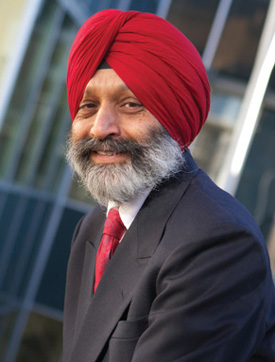Calgary selects its second dean


Dr. Baljit Singh has been named as dean of the University of Calgary Faculty of Veterinary Medicine, effective Sept. 1. The announcement was made in an April 20 letter by Provost Dru Marshall, who called Dr. Singh “an innovative and well-respected leader.”
Prior to joining Calgary, Dr. Singh had served as associate dean of research at the University of Saskatchewan since 2011.
He received his master’s of veterinary science from Punjab Agricultural University in Punjab, India; a doctorate from the University of Guelph; and postdoctoral training at Texas A&M University and at Columbia University in New York City.
Dr. Singh’s research has focused on cell and molecular biology of lung inflammation. In 2013, he was named a fellow of the American Association of Anatomists.
Dr. Singh succeeds Dr. Alastair E. Cribb, who completed his term as the veterinary school’s inaugural dean June 30.
Dr. Cribb earned his DVM degree in 1984 from the Western College of Veterinary Medicine in Saskatoon, Saskatchewan. Following an internship and two years in mixed practice in the Canadian Maritimes, he obtained his doctorate in pharmacogenetics/clinical pharmacology at the University of Toronto’s Hospital for Sick Children in 1991. Dr. Cribb followed this with a Medical Research Council postdoctoral fellowship at Dalhousie University in Halifax, Nova Scotia. In 1996, he joined the University of Prince Edward Island Atlantic Veterinary College as a professor of clinical pharmacology. He accepted the position of Calgary’s dean in May 2006.
Calgary’s veterinary school was established in 2005, and in 2008, 34 students entered its inaugural class. In October 2012, the institution was awarded full accreditation for seven years by the AVMA Council on Education, becoming the fifth and most recent Canadian veterinary program with that designation.
Calgary was one of the first in North America to use the distributed model of education in veterinary education. Students engage in off-campus learning activities in all semesters, with most of their fourth year spent working with veterinarians from the province of Alberta and the Distributed Veterinary Learning Community, comprising private and public practices as well as federal and provincial agencies.
The school also has research programs across the range of veterinary and comparative biomedical sciences. Areas of strength include cattle health, disease ecology, infectious diseases, pain and animal welfare, equine health, reproduction and regenerative medicine, and veterinary education.
In 2015, the veterinary school had approximately 70 faculty members, 125 veterinary students, 12 advanced clinical trainees, and 100 graduate students.